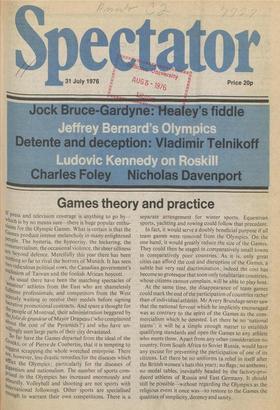Games theory and practice
If press and television coverage is anything to go byw.hich is by no means sure—there is huge popular enthusiasm for the Olympic Games. What is certain is that the Games produce intense melancholy in many enlightened People. The hysteria, the hypocrisy, the bickering, the cftmercialism, the occasional violence, the sheer silliness are beyond defence. Mercifully this year there has been ,11°thing so far to rival the horrors of Munich. It has seen 'ilyco ridiculous political rows, the Canadian government's exclusion of Taiwan and the foolish African boycott. As usual there have been the matching spectacles of faThateue athletes from the East who are shamelessly ..alltime professionals, and competitors from the West ,'carcely waiting to receive their medals before signing ittli_crative promotional contracts. And spare a thought for tail° People of Montreal, their administration beggared by „efolie de grandeur of Mayor Drapeau (who complained 71out the cost of the Pyramids?') and who have un „illoglY seen large parts of their city devastated. r, 4) far have the Games departed from the ideal of the reeks, or of Pierre de Coubertin, that it is tempting to auggest scrapping the whole wretched enterprise. There Le, however, less drastic remedies for the diseases which '1.111ct the Olympics; ,particularly for the diseases of &`lantism and nationalism. The number of sports cornPs,lised in the Olympics has increased enormously and igosurdly. Volleyball and shooting are not sports with enternational followings. Other sports are specialised 11°Iigh to warrant their own competitions. There is a separate arrangement for winter sports. Equestrian sports, yachting and rowing could follow that precedent.
In fact, it would serve a doubly beneficial purpose if all team games were removed from the Olympics. On the one hand, it would greatly reduce the size of the Games. They could then be staged in comparatively small towns in comparatively poor countries. As it is, only great cities can afford the cost and disruption of the Games. a subtle but very real discrimination: indeed the cost has become so grotesque that soon only totalitarian countries. whose citizens cannot complain, will be able to play host.
At the same time, the disappearance of team games could mark the end of the participation of countries rather than of individual athletes. Mr Avery Brundage never saw that the national fervour which he implicitly encouraged was as contrary to the spirit of the Games as the commercialism which he detested. Let there be no 'national teams' : it will be a simple enough matter to establish qualifying standards and open the Games to any athlete who meets them. Apart from any other consideration no country, from South Africa to Soviet Russia, would have any excuse for preventing the participation of one of its citizens. Let there be no uniforms (a relief in itself after the British women's hats this year); no flags; no anthems; no medal tables, inevitably headed by the factory-produced athletes of Russia and East Germany. It should still be possible—without regarding the Olympics as the religious event it once was—to restore to the Games the qualities of simplicity, decency and sanity.


































